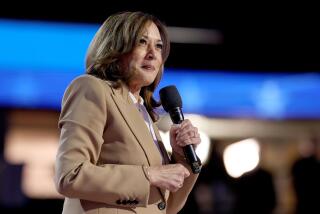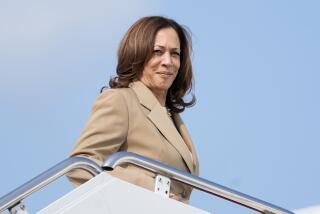Kerry Fends Off Finance Questions
- Share via
FARGO, N.D. — John F. Kerry swatted away questions about fundraising for one of his Senate campaigns and camped out in this icy city Sunday to watch the Super Bowl as he sought to offer himself as the only Democratic presidential candidate running a broad-based campaign.
His three chief rivals were scattered across the country, seeking to erect regional roadblocks to slow the gathering momentum for the Massachusetts senator. The efforts by John Edwards in South Carolina, Wesley K. Clark in Oklahoma and Howard Dean in Michigan and Wisconsin could amount to a last stand against the frontrunner.
For a second straight day, Kerry faced scrutiny about his political finances. The questions stemmed from a Newsweek magazine article about links between Kerry and Taiwanese American entrepreneur Johnny Chung.
In September 1996, Chung arranged a fundraising event in Beverly Hills for Kerry, who was facing a tough reelection campaign.
Chung met with Kerry before the fundraiser, in July 1996, Newsweek reported. At about the same time, an associate of Chung’s -- who turned out to be a Chinese military officer -- was seeking help with a matter pending before the Securities and Exchange Commission, and a Kerry aide sent the SEC a helpful letter. Kerry also penned a note of thanks to Chung in July 1996 for his help with the campaign, Newsweek reported.
In 1998, Chung pleaded guilty to charges stemming from $20,000 in illegal contributions to President Clinton’s reelection campaign and $8,000 in illegal contributions to Kerry raised at the Beverly Hills event.
Kerry was not accused of wrongdoing, but the episode was an embarrassment.
“This is old news,” Kerry told reporters here. “It’s been thoroughly vetted.”
Kerry also said he had no recollection of the July 1996 encounter with Chung. He described the note to Chung as a routine fundraising chore and noted that he had returned the contributions from him.
On Saturday, Kerry faced questions about whether his populist pledges to fight “powerful special interests” as president were contradicted by large contributions he has accepted over the years from some of the groups he has attacked.
Kerry responded that donations did not influence his policy positions.
Kerry’s prolonged stay in Fargo was a sign of his confidence in his prospects in the seven states holding Democratic primaries and caucuses Tuesday. He arrived here late Saturday and was to leave late Sunday for an overnight stay in Albuquerque.
At stake in the North Dakota vote are just 14 of the 2,161 convention delegates needed to capture the Democratic nomination. Missouri has 74 delegates up for grabs Tuesday, more than any of the other six states; polls show Kerry leads there.
South Carolina, Oklahoma and Arizona, all with closer races, have a combined 140 delegates.
With his attacks on President Bush, Kerry fired up a crowd of more than 700 at the Fargo Air Museum during a rally that was his only public event for the day. But his mind clearly was elsewhere as his home state team, the New England Patriots, prepared to face the Carolina Panthers.
“I’m going to watch the Super Bowl in Fargo with North Dakota patriots!” Kerry said. “I’m going to watch with North Dakota patriots who want to send George Bush back to Texas permanently.”
Even as Kerry relaxed in front of a wide-screen television showing the game at a sports bar in Fargo, he continued to benefit from his victories in the Iowa caucuses and New Hampshire primary. He received endorsements from Gov. Gary Locke of Washington state, which caucuses Saturday; from the United Farm Workers of America; and from the Kansas City Star newspaper in Missouri.
Dean, the former Vermont governor, stumped in Wisconsin, which holds its primary Feb. 17, and Michigan, which conducts a caucus Saturday. He charged that Kerry could not credibly portray himself as an opponent of special interests after taking large amounts of money from such groups as a senator.
“Sen. Kerry asked me to apologize yesterday,” Dean told reporters as he flew from Milwaukee to Detroit. “I think he owes an apology to the American people after what’s come out today” in the Newsweek article.
Dean’s schedule indicated that he is not counting on a strong showing in Tuesday’s contests and is focusing on races later this month. Appearing on NBC’s “Meet the Press,” he also said he would not continue his candidacy simply to “prove a point.”
“If someone gets the mathematical amount of delegates, I’m not going to blindly go forward,” he said.
Clark, a retired Army general, emphasized his military record in Vietnam in a swing through Oklahoma. At a town hall meeting in Lawton, he appeared with Mike McClintic, the man credited with saving Clark’s life after he was wounded in a jungle in 1970.
“I heard this buzzing and my rifle fell out of my hand. I looked down to pick up my rifle and saw a piece of bone sticking out of my hand,” Clark said. “I remember saying to Mike, I said, ‘My God, I’ve been shot.’ What I remember him saying to me is, ‘Well, get down!’ ”
McClintic, at the time a 22-year-old private, draped himself over Clark, a 25-year-old captain, to protect him. The two had not seen each other since Clark was flown by helicopter out of the jungle, Clark’s campaign said.
“Mike,” Clark said shaking his hand Sunday, “you saved my life.”
McClintic, who lives in Michigan, said: “When Wesley Clark was our commanding officer, there was never any question about who was in command, who was the leader, who was responsible, who had the courage and determination to take us where we needed to go.”
Edwards, a senator from North Carolina, campaigned heavily in the state where he was born -- South Carolina -- in quest of a victory to keep his candidacy alive. He attended a two-hour church service in Columbia and told the congregation that as the son of a South Carolina textile mill worker, he was uniquely qualified among the Democratic contenders to fight for the working class.
“President Kennedy said here on Earth, God’s work must really be our own, and we have work to do, don’t we brothers and sisters?” Edwards said.
The Rev. Al Sharpton delivered three rousing sermons at black churches in Aiken and North Augusta in a campaign swing through South Carolina.
He also held a town hall meeting that drew some pointed questions from African American voters about his positions on amnesty for illegal immigrants, abortion rights and gay marriage. He supports all three. He told his listeners the struggle for civil rights is not over.
“People talk about ‘back in the days,’ ” Sharpton said. “Well ... you still have issues that need to be dealt with.”
In the meantime, campaign finance reports released by the Federal Election Commission showed that Kerry had raised $25 million by the end of 2003, but he spent even more. He loaned his campaign more than $6 million when fundraising dwindled, and ended the year with $1.6 million in cash.
Data analyzed by Dwight L. Morris and Associates, an independent campaign finance monitor, showed that Californians gave Dean nearly $4 million out of the $41 million he raised last year. Dean ended the year with about $9.6 million on hand.
Clark ended the year with about $3.4 million after raising about $13.8 million. Sen. Joe Lieberman of Connecticut, who campaigned in Delaware on Sunday, raised about $14 million but spent nearly all of it, ending the year with $612,000. Edwards raised about $16.4 million and ended the year with $275,000 in cash.
Reports showed Bush’s reelection campaign had $99 million in cash at the end of the year.
Anderson reported from Fargo, Gold from Detroit. Times staff writers Scott Martelle, Eric Slater, Robin Abcarian and Lisa Getter contributed to this report.
More to Read
Get the L.A. Times Politics newsletter
Deeply reported insights into legislation, politics and policy from Sacramento, Washington and beyond. In your inbox twice per week.
You may occasionally receive promotional content from the Los Angeles Times.










